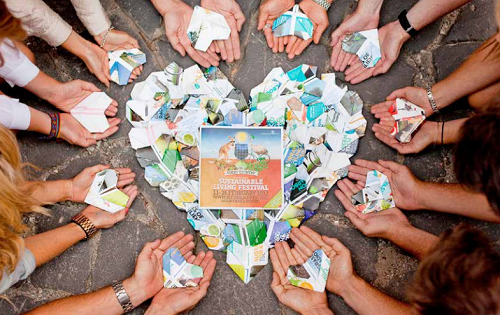February 2018 will see the Melbourne-based Sustainable Living Festival (SLF) bring what it calls “the vital message of sustainability” to the forefront of our consciousness. Now in its 19th year, the Festival is Australia’s largest event of its kind and runs throughout the entire month of February 2018.
Melbourne, 20 November 2017. Based on the theme of “it is climate crunch time’ the festival asserts that everything we care about is now under threat. In 2018 the festival continues its mission to raise awareness of climate impacts and risks, provide solutions to transition to below zero emissions, and mobilise people for a safe climate transition. The event is targeted at working urgently to help solve the climate crisis, and helping to connect hundreds of organisations from around Australia for the world’s first safe climate focused festival. The 2018 SLF is making it a mission to present the latest discoveries that can help restore a safe climate as fast as humanly possible.
The SLF has been helping people from across Australia understand sustainability awareness for almost 20 years. Courtest SLF.
Paul Hawken delivers the star lecture at the 2018 SLF. Courtesy Paul Hawken.
The organisers bill the Festival as providing a major platform for leaders, innovators and entrepreneurs to activate new audiences and promote their message. In 2017, it certainly attracted attention, with 150,000 visitors, 300 events, 150 exhibitors and hundreds of volunteers all coming together over 25 days to hear some of the world’s best local and international sustainability experts give lectures, open shows and hold workshops. This year’s star speaker will be American environmentalist, entrepreneur, author, and activist Paul Hawken, who noted previously that a vital element of changing public perspectives is that “Good management is the art of making problems so interesting and their solutions so constructive that everyone wants to get to work and deal with them.”
For nearly 20 years, the SLF’s open-access format has encouraged this kind of participation through education, art, film, performance, symposium and exhibitions and has helped in raising awareness about the ecological and social challenges and showcasing the tools that can help bring change.
In 2011, global environment campaigner David Suzuki said in a lecture that the SLF: “ … has been totally inspired. . . it has given me a renewed direction of what we need to do in Canada for our climate and environment.”
"SLF... has given me a renewed direction of what we need to do" - David Suzuki. Courtesy SLF.
The 2018 festival will run for the entire month of February with events to be staged in multiple cities, suburbs and regional towns across greater Melbourne. Visitors and partners will be provided with opportunities to join the event program, and to engage directly with a very discerning audience.
The SLF will run three distinct themes as party of its lineup, with Already too Hot, Make it Safe, and Mobilise Everyone Everywhere as the key thrusts. These will revolve around issues such focussing on raising awareness about dangerous climate impacts and risks, a rapid transition to a 'below zero emissions' society, and the role of our current society.
Additionally, the importance of support from the 'super majority' for a safe climate transition and ways to mobilise large numbers of people to move towards a safe climate transition will be investigated. If you want to volunteer, click here.
SLF organisers say the festival will present a rich program of home and lifestyle solutions including talks, workshops, art, film, performance and markets to educate and inform the widest possible audience about the importance of their own state of sustainability.


